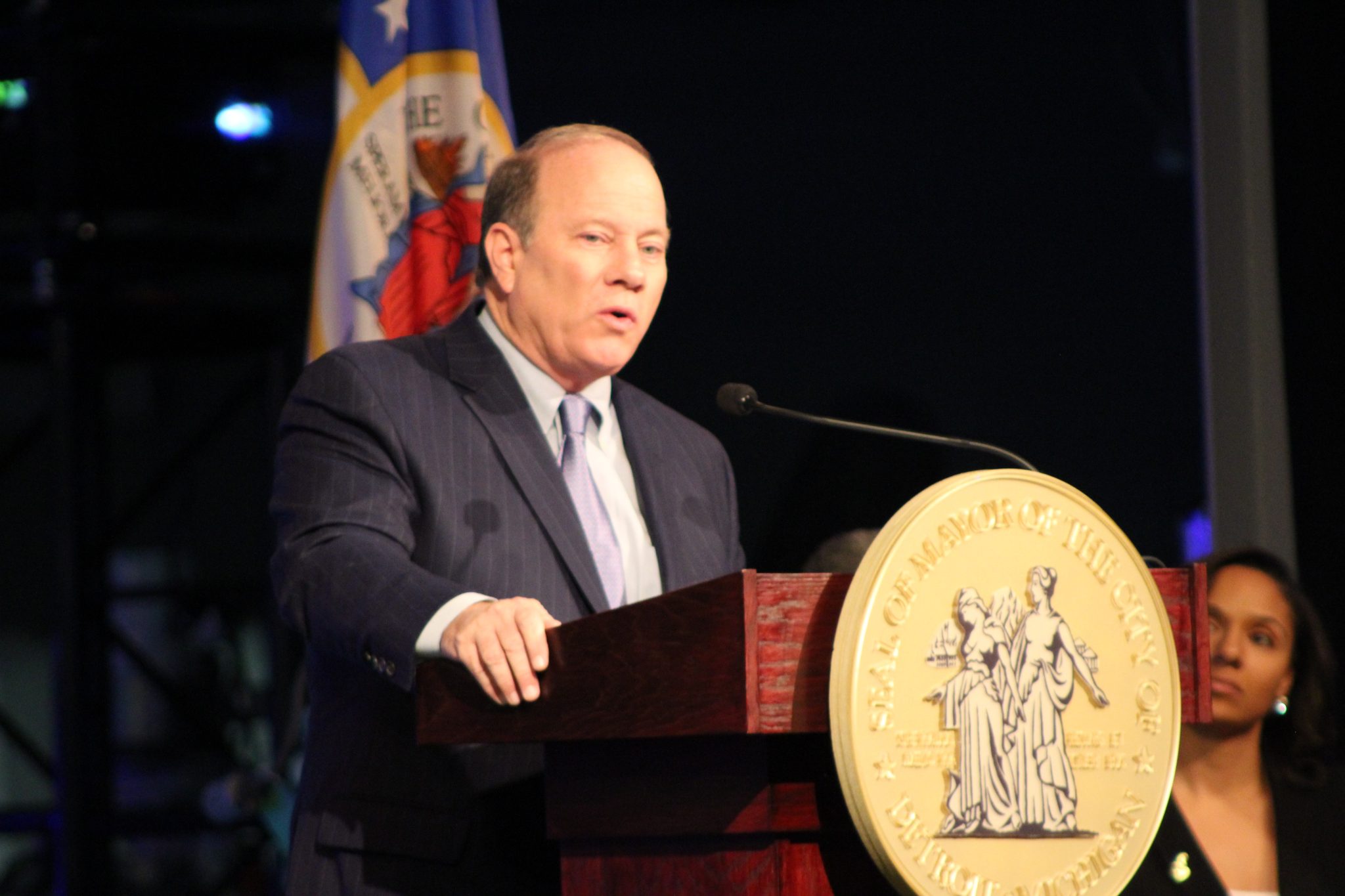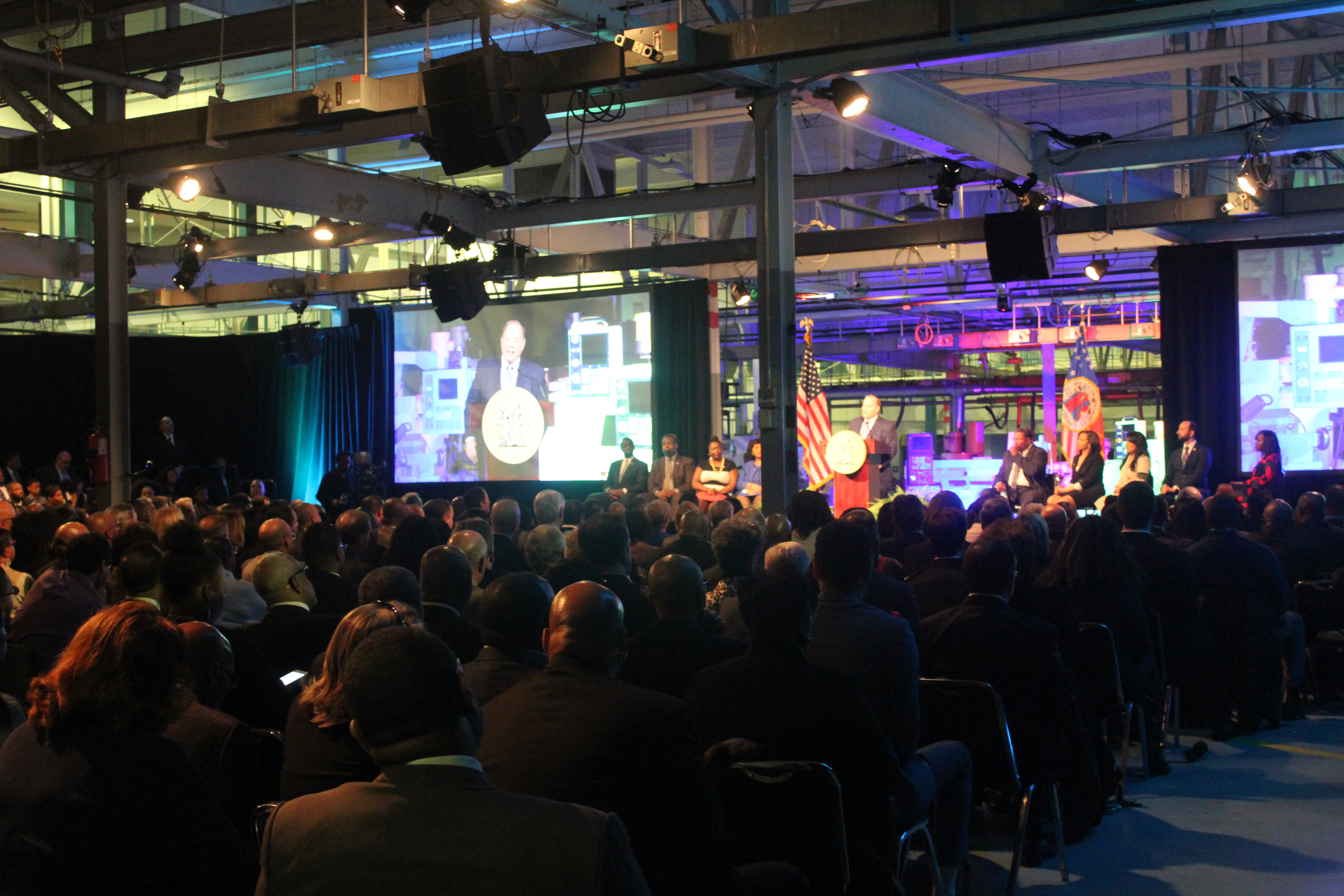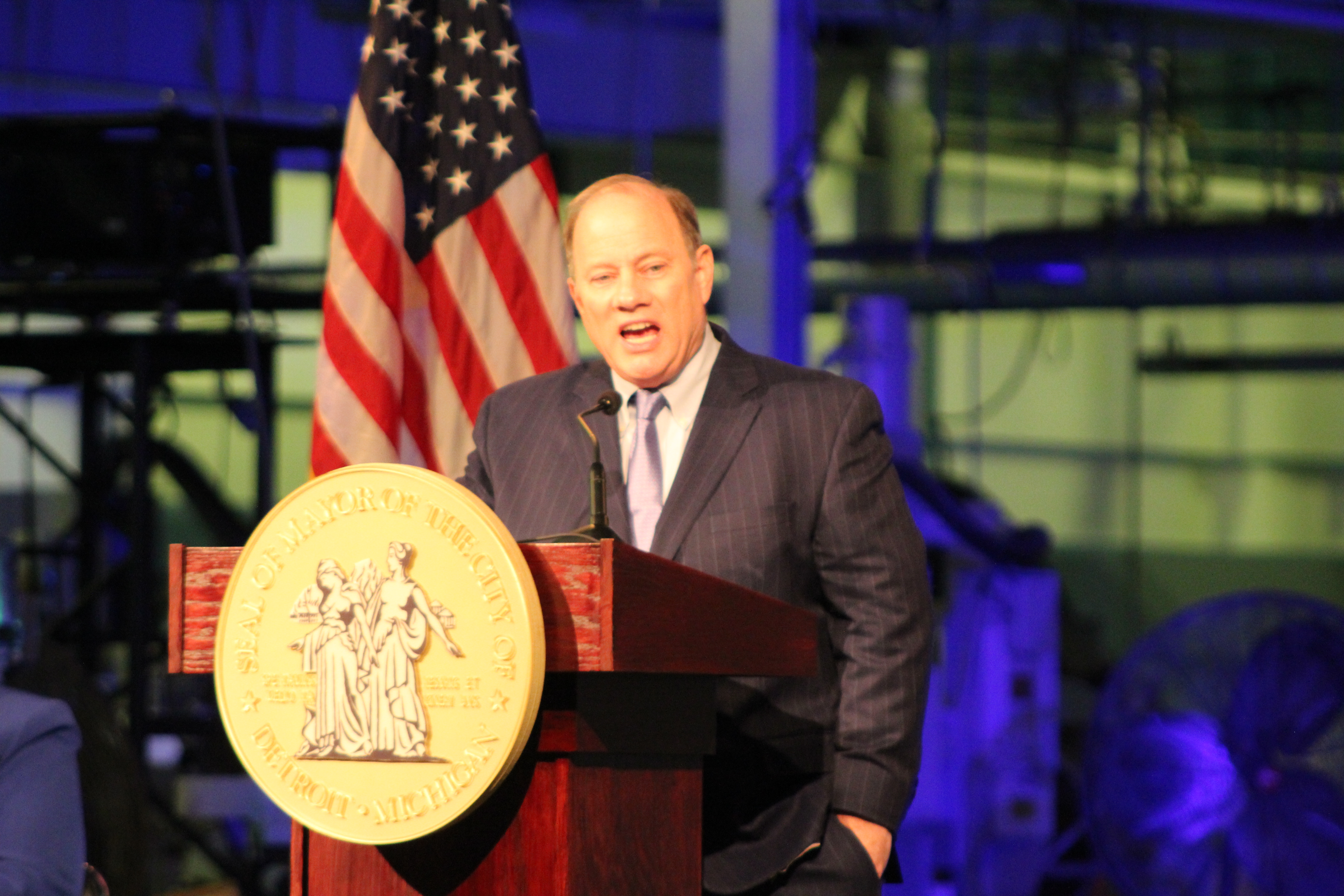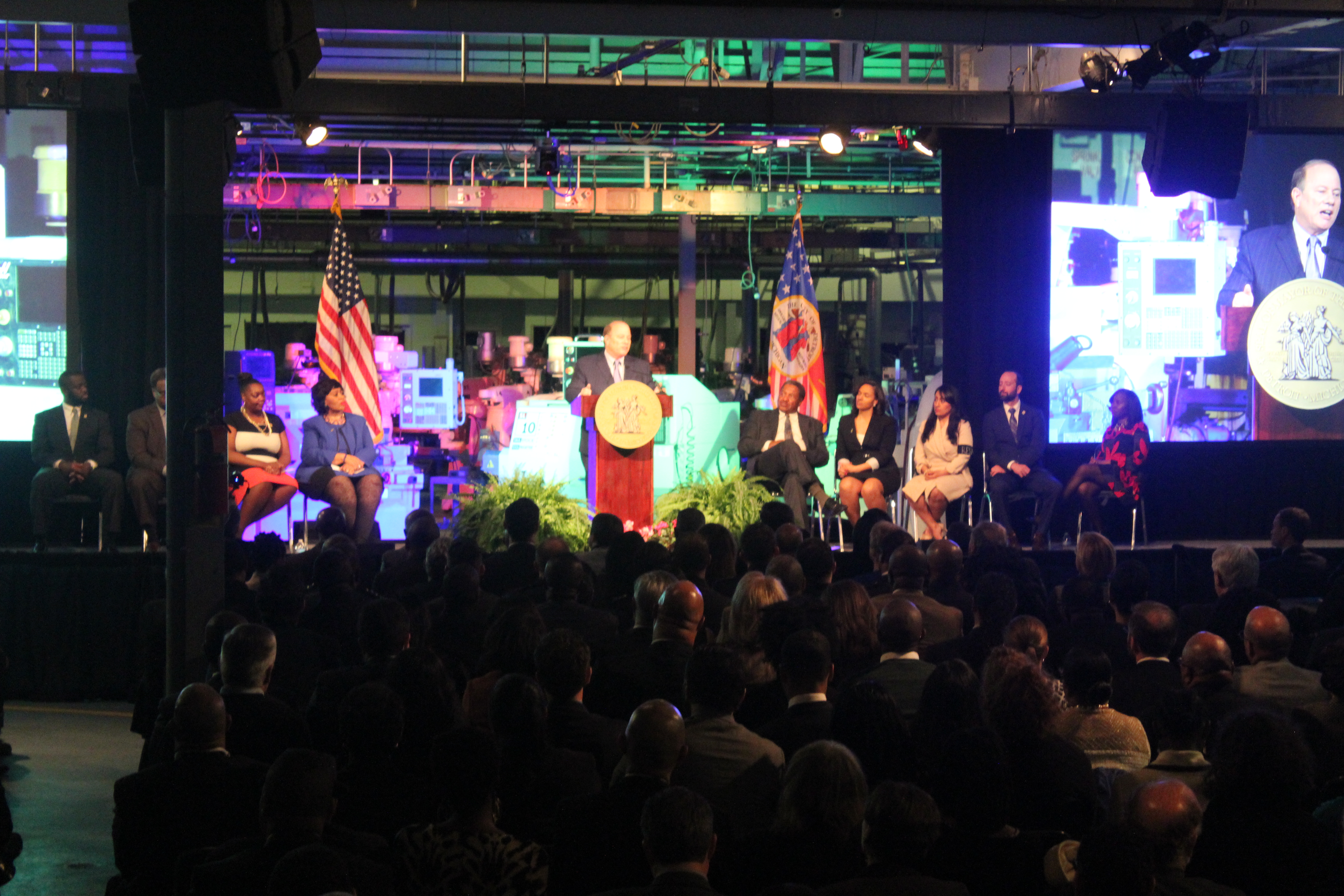“What Comes Next” the Focus of Duggan’s State of the City Speech
Neighborhoods, insurance, immigration, development and public safety among top issues addressed by Duggan.

In an upbeat speech touting his administration’s accomplishments and announcing new programs to help address deep city issues, Mayor Mike Duggan delivered a nearly hour-long State of the City address Tuesday night.
“There’s a great deal more hope in the city of Detroit than when I delivered the first State of the City three years ago,” said the first-term mayor who is running for re-election this year.
Duggan began by describing the Detroit of three years ago — a city in bankruptcy, city retirees fearing the loss of their pensions, closed and consolidated police stations, overgrown parks and streetlights that didn’t work.
But he said conditions today are better: the city’s budget is balanced, emergency response times are reduced, street lights are working, parks are open and thousands of vacant houses have been torn down.
“We’ve improved the basic services but if we’re going to fulfill a vision of building a Detroit that includes everybody, we’ve got to do a whole lot more,” Duggan said.

“WHAT COMES NEXT”
Throughout the speech at Focus:HOPE to an invitation-only crowd, the mayor focused on and committed to future efforts, beginning with jobs programs. The city’s 9.8% unemployment rate, he said, is the highest of any city in Michigan and means, “We have a whole lot more work to do.”
Duggan announced the new “Detroit at Work” website that aims to connect potential employees with jobs that are actually available. “Here’s what’s different about what’s happened. This time we went to the employers in the city and we said to them, ‘What jobs are you hiring for?’” he said.
The answer: apprentices, coders, food prep staff, construction and hospital workers. “All those jobs that are available are now on that site,” Duggan said, adding that city administrators also are working with people coming out of prison so they can find work.
PROMISE AND PRIVILEGE

Duggan touted the city’s summer jobs program, which last year employed nearly 8,000 teens and young adults, and he reminded the audience that the Detroit Promise program means high school graduates can receive two years of tuition at a community college.
That program, Duggan said, is expanding to four years at a university for students with a 3.0 grade-point average and 21 ACT score.
“If you apply yourself, college is going to be available to anyone who graduates from a Detroit high school,” Duggan said. “It’s one of the privileges of growing up in the city of Detroit.”
But the mayor also addressed the state’s recommendation that 24 schools in the city be closed for low performance, promising to stand with the elected school board in opposition to the proposed closures.
“Closing those schools doesn’t add a single quality seat,” he said. “All it does is bounce our children around from place to place. We know we need to improve these schools, but before you close these schools you need to make sure there’s a better alternative.”
WELCOMING CITY
Some of the longest applause came when Duggan addressed Detroit’s commitment to its immigrant residents. Earlier this month, the city council passed a resolution opposing President Trump’s first executive order limiting immigration and re-affirming that Detroit is a welcoming city.
“To the immigrant community on the question of what comes next,” Duggan said tonight, “I want to be clear: Detroit is going to stand as a pro-immigration, welcoming city. We’re not going to waiver from there.”
As an example of how the city enacts that claim, Duggan said the Detroit Police Department for a decade has included in its training that officers do not ask people about their citizenship or immigration status. “It is core to who the Detroit police are today, and it has not changed,” Duggan said.
He also spoke about 50 Syrian refugee families who have re-settled in Detroit. “They’ve come here with nothing but acceptance because that’s who we are as a city,” Duggan said.

THE NEIGHBORHOODS
Turning to what he called “another group feeling vulnerable,” Duggan said people who are currently living in affordable housing will not be displaced by development.
“This city is big enough, there’s room for everyone,” he said. “We know the progress of Detroit is going to be defined by its neighborhoods.”
He promised to speed up the pace of the demolition of vacant homes and he addressed the federal probe into practices related to that process.
“To me, getting rid of (vacant homes) is a matter of life and death,” he said. “I put enormous pressure on the land bank to move very, very fast, probably faster than the controls they had in place.”
Duggan said a new set of practices is in place that has city and state workers on each contract, additional financial and compliance oversight, and other safeguards.
“We believe at the rate we are ramping up, we are going to be able to take out 10,000 abandoned homes in this city over the next two years,” Duggan said. “We are committed to being a program that is fully compliant.”
To spur investment in the city’s neighborhoods, Duggan said the new Strategic Neighborhood Fund would usher $30 million into economic development projects outside of downtown. “The first $30 million will be only the beginning,” Duggan said.
PUBLIC SAFETY
“Our city is never going to reach its potential until everyone is safe,” Duggan said before describing plans for future policing efforts.
He promised more officers, new precinct facilities and new technology.
With last year’s pay raises for officers, Duggan said the police academy is training more recruits with currently 200 enrolled. He said new and re-opened precinct buildings are making police services more available to citizens and helping to “connect police to this community.”
He touted the “green light” program and credited it for a reduction in violence and crime at gas stations. But he also said more needs to be done. “Homicides did not drop,” Duggan said.
INSURING THE CITY’S FUTURE
Duggan also pledged to address high homeowners and car insurance rates in the city, in no uncertain terms.
“Everybody in this state is getting screwed by the no-fault system,” he said to applause. “I want to talk about an issue that is seriously holding back Detroit’s future.”
With car insurance rates double the rest of the state, Duggan said he has repeatedly asked the Legislature to allow Detroit to create a city-specific or alternative insurance system. He compared the issue to recent discussions in Lansing about reducing the state income tax rate.
“The income tax cuts may be worth a couple hundred bucks,” Duggan said. “If you solve the car insurance, you’ll put three or four times that back in people’s pockets and you won’t hurt any state services.
“All of us are paying the bill. I’m asking at this point we get together. We should address this on a statewide basis,” he said. “This affects everybody.”
